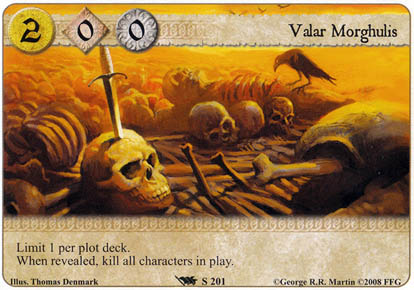Welcome to Card Game DB
Register now to gain access to all of our features. Once registered and logged in, you will be able to create topics, post replies to existing threads, give reputation to your fellow members, get your own private messenger, post status updates, manage your profile and so much more. If you already have an account, login here - otherwise create an account for free today!
Register now to gain access to all of our features. Once registered and logged in, you will be able to create topics, post replies to existing threads, give reputation to your fellow members, get your own private messenger, post status updates, manage your profile and so much more. If you already have an account, login here - otherwise create an account for free today!
Valar Morghulis
Submitted
Darksbane
, Aug 17 2010 03:24 AM | Last updated Mar 01 2011 08:47 PM
- pak88 likes this

Valar MorghulisType: Plot House: Neutral Income:2 Initiative: 0 Claim: 0 Game Text: Limit 1 per plot deck. When revealed, kill all characters in play. Number: 201 Set: Core Quantity: 1 Illustrator: Thomas Denmark |
|
| Recent Decks: |
Targaryen Dragons AMBUSH Strength of the Night Lanni Kneel Noble Martel Quentyn Melee |



 Sign In
Sign In Create Account
Create Account












28 Comments
For example, can someone cancell the killing effect of Valar with He Calls it Thinking? It is a response without an Influence cost, but it sounds too cheesy.
How do cancels work with "When Revealed"?
However, Outwit (TIoR) and Old Bear Mormont (RotO) can be used to cancel Valar or any other "When Revealed" effect, for example.
Valar's effect for example is passive.
My question is whether Joffrey Baratheon (Core) can score 3 points before he dies himself, in some cases this might win a match.
So everyone who isn't saved will die at the same time to Valar, and then in the response step, Joffrey will be able to use his response, which could cause the game to end whilst he is moribund: dead pile (assuming he died).
Assuming your flipped VM, Joffrey is your character and that VM is the plot chosen to resolve first, here is the timing:
Step 1 Initiation: Valar initiates
Step 2 Saves/Cancels: Use any available saves here. In this example, lets say 3 lords have not be saved - including Joffrey.
Step 3 Resolution: All characters not saved become moribund:dead pile
*Repeat Step 1, 2 & 3 for opponent's plot
Step 4 Passives: Any passives to things that have occurred in any of the previous steps (including Step 4) - example would be Golden Tooth Mines (Core)
Step 5 Responses: Starting with the first player, players take turns triggering 1 response at a time if applicable. Your opponent has nothing to trigger so you trigger Joffrey's response to the first lord that died and claim a power. Your opponent passes on responses. You trigger Joff and get a power. Opponent passes. You trigger Joff and get a power.
Step 6 Clean-up: all moribund cards leave play
Assuming you only needed that 3 power to reach 15 you win before your cards leave play.
i think it is good only when you are losing the game, if you are winnin the game, and have no way of saing your own card, it will be awful
Some decks play consistently around it, though. Especially decks based on saving or unkillable characters.
VM says "kill all characters" but by doing so i would be "discarding it from play"
It's that right?